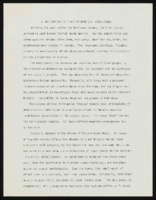Search the Special Collections and Archives Portal
Search Results

Gabriel Garcia oral history interview: transcript
Date
Archival Collection
Description
Oral history interview with Gabriel Garcia conducted by Monserrath Hernandez and Barbara Tabach on November 13, 2019 for the Latinx Voices of Southern Nevada Oral History Project. In this interview, Garcia discusses his early life in Arizona and moving to Las Vegas, Nevada in 1984. He remembers attending a sixth grade center, the Pacific Engineering and Production Company of Nevada (PEPCON) explosion, and attending Las Vegas High School. Garcia talks about Mexican culture in Las Vegas, car clubs, and becoming a graphic designer. Lastly, Garcia discusses his involvement with the Association of Latino Professionals for America, and the idea of diversifying the professional workplace.
Text

"A Half Century of Black Memorabilia: 1890-1940s": manuscript draft by Roosevelt Fitzgerald
Date
Archival Collection
Description
From the Roosevelt Fitzgerald Professional Papers (MS-01082) -- Unpublished manuscripts file.
Text
Dunes Hotel Photograph Collection
Identifier
Abstract
The Dunes Hotel Photographs (1950-1993) consist of administrative, publicity and entertainment images documenting the history of the Dunes Hotel and Casino in Las Vegas, Nevada. In addition to materials focusing on day-to-day activities at the hotel (correspondence, contracts, personnel, budgets, etc.) the collection provides insight into the hotel’s entertainment and public relations activities. Although there are chronological gaps in the collection, particularly during the later years of the Dunes (1970s-1990s), it provides a significant amount of historical documentation on the famed Strip hotel that was long known to tourists and residents alike as the “the Miracle in the Desert.”
Archival Collection
Dunes Hotel and Casino Records
Identifier
Abstract
The Dunes Hotel and Casino Records are comprised of administrative, publicity, and entertainment materials documenting the history of the Dunes Hotel and Casino in Las Vegas, Nevada from the years 1954 to 1992. Included are correspondence, contracts, photographs, hotel budgets, and an early aerial photograph of the property. The material provides a significant amount of historical documentation of the hotel that was long known to tourists and residents as the "the Miracle in the Desert."
Archival Collection

Transcript of interview with Anna Sipl Meyers by Leita Kaldi Davis, February 12, 2012, February 29, 2012, March 27, 2012, April 6, 2012, April 24, 2012, May 3, 2012, May 9, 2012, May 16, 2012, October 19, 2012, November 16, 2012, & December 7, 2012
Date
Archival Collection
Description
From concentration to ownership of Las Vegas casinos, Meyers owned the Cashbah and the and Queen of Hearts in downtown Las Vegas. Interview dates: 2/12/2012, 2/29/2012, 3/27/2012, 4/16/2012, 4/24/2012, 5/3/2012, 5/9/2012, 5/16/2012, 10/19/2012, 11/16/2012, 12/7/2012.
Text

Transcript of interview with Mary Ellen Campbell by Ronald Robinson, March 6, 1977
Date
Description
On March 6, 1977, Ronald Robinson interviewed Mary Ellen Campbell (born 1886 in Panaca, Nevada) about her life in Nevada. Campbell first talks about her parents’ move to the United States from England and her own life growing up in Panaca. She also talks about living in Pioche and the conditions of living in these two small Nevada towns. Also present during the interview is Mary’s grandson, Allen Campbell, who sometimes asks a few questions as well.
Text

Transcript of interview with Carl Ciliax by Gary Wood, March 8, 1980
Date
Archival Collection
Description
On March 8, 1980, Gary Wood interviewed Carl Ciliax (born 1941 in Las Vegas, Nevada) about his experiences living in Nevada. Ciliax first describes his family history, his early interests in wildlife, and his background and education in artwork. Ciliax then discusses his early experiences in hunting and his eventual interest in conservationism and preservation, including his involvement with organizations that sought the protection of desert bighorn sheep and the protection of wildlife in general. The two talk more about wildlife, the early development of Las Vegas, and the effects of the atomic testing. The interview concludes with Ciliax’s recollection of recreational activities and some of his thoughts on conservationism.
Text

Transcript of interview with Joanne Pattiani Molen by Irene Rostine, January 25, 1997
Date
Archival Collection
Description
Interviewed by Irene Rostine. In July of 1955, Joanne Molen's husband was offered a job at Nellis Air Force Base, so they moved from Alturas, California, to Las Vegas. Joanne had worked for Citizens Utilities in Alturas as a Western Union teletype operator, so she got a job with the Southern Nevada Telephone Company. She was the only woman to hold some of the positions she held. She worked for the telephone company, which became Sprint, for more than forty years, ending up as a main engineer. Joanne also was a volunteer and was active in community organizations including the American Ex-Prisoners of War and the Disabled American Veterans organizations, which lead to her being appointed by Governor Richard Bryan to the state of Nevada's Veterans Advisory Commission where she became the first woman to hold the position of chairman for the Commission. She was also voted Women of the Year four times by the local chapter of the American Business Women's Association for her work with veterans.
Text

Transcript of roundtable interview with the Holocaust Resource Center: Myra Berkovits, Susan Dubin and Doug Unger, by Barbara Tabach, September 4, 2014
Date
Archival Collection
Description
Interview with Myra Berkovits, Susan Dubin and Doug Unger of the Holocaust Resource Center. In this interview, the group discusses the beginnings of what is now the Sperling Kronberg Mack Holocaust Resource Center. Edythe Katz-Yarchever is discussed as the catalyst for establishing the center and getting others involved with the Governor's Advisory Council on Education Relating to the Holocaust. Berkovits talks about her role as a liason for Holocaust education in the Clark County School District and the student-teacher conferences held each year with funding from Sheldon Adelson. Unger discusses expanding the outreach to the Washoe County School District with assistance from Atlantis Hotel (Reno, Nev.) owner, John Farahi and Judy Mack. They talk about the previous locations of the Holocaust Resource Center on Maryland Parkway, then Renaissance Drive, and the affiliation with the Jewish Federation and the Jewish Family Service Agency. After funding and personnel issues around 2011, the advisory council and the library went through a re-structuring and hired Susan Dubin who organized and catalogued the library collection. The library is now accredited by the Association of Jewish Libraries.
Text

Julie McDonald interview, March 14, 1981: transcript
Date
Archival Collection
Description
On March 14, 1981, Michael Richardson interviewed Julie McDonald (b. 1945 in Torrance, California) about her childhood and life in Las Vegas, Nevada. McDonald shares her first impressions of Las Vegas, her schooling and the location of residential areas. Throughout the interview, McDonald also goes into detail concerning her occupations at the Guild Theatre, her secretarial work at Nellis Air Force Base, her singing career and being a “21” dealer. McDonald discusses the changes in the gaming industry, particularly the incorporation of women dealers, the use of the silver dollar and the requirements for dealers. McDonald ends by discussing housing, major happenings within Las Vegas, recreation as a kid and mass media in early Las Vegas.
Text
